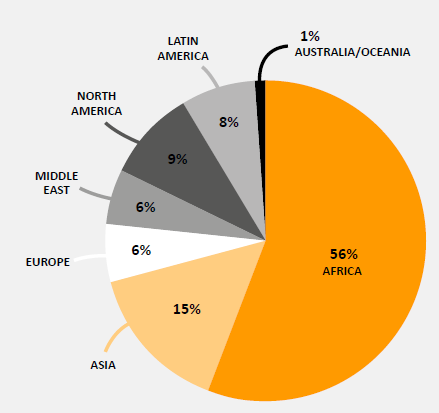When I started in international development, it was common for people from the so-called “Global North” to win most of the mid- to senior-level positions.
There are many good and less-good explanations for this.
Often, education was stronger. Countries funding positions played a role in which nationals won jobs. Blatant discrimination existed.
But things are changing.
Today, we’re in a global development jobs shift
When 100+ recruiters were asked where they expected most jobs to be around the world, the findings tell of a powerful shift.

56% of recruiters see most new jobs in Africa
This is part of the trend to localize positions in country offices, government ministries and communities themselves.
Oxfam, for instance, recently moved its Headquarters from Oxford to Nairobi.
UNDP, among other UN agencies, has been following a shift to localize staff appointments in project teams and country offices in the so-called “field”, rather than New York or Geneva.
This all points to:
- Greater availability of opportunities in Africa and secondly, in Asia.
- The need for field experience and cross-country exposure.
- A growing demand for African and Asian nationals with the right skills, education and experience
So, what are the rights skills needed?
Now, another recent report asked development professionals: “What professional career path will be most in demand in the next 10 years?”
The answer?
75% of respondents felt “integrators” would be most in-demand—rather than generalists or specialists alone.
The future of global development will require you to not just hold specific subject matter expertise
As an integrator, you must understand how multiple specialists impact EACH other, and facilitate collaboration.
You will need to seek out new partners, technologies, thinkers—create new approaches.
The most important skill will be making the whole much more than a sum of its parts.
As we see the global and regional trends on progress to achieve the Sustainable Development Goals, the global development framework guiding strategies and funding, we are observing that we are largely off-track.
One of the keys to correcting the course for achieving the 17 Global Goals will be the role of integrators—those who can bridge multiple perspectives, manipulate both old and emerging concepts, and motivate action as a leader.
Now is THE time
The coming job trends are clear.
As the future of work evolves, we need to build…
- Complex problem-solving skills. When it comes to human rights, conflict and climate change, there are no easy solutions. Only problems. Are you prepared to think critically to address them?
- Leadership. Many of us have information—and increasing access to it. But can you demonstrate to international organizations the capacity to use it wisely to lead others?
- Application of expertise. Yes, graduate and postgraduate degrees taught you some knowledge. Do you know how to USE it to make your organization work better?
Beyond BUILDING these skills, you need to SHOW to others that you have them.
The trouble is…
No course or training you’ve taken taught you how.
Yet, as our countries and world evolves, these are the SKILLS in demand.
You have to ask yourself…
Are you ready?
One reply on “The Global Development Jobs Shift”
[…] I’ve shared before, global development is undergoing a jobs shift to positions being held in Africa, Asia, the Middle East and Latin […]